You had to be either a World Champion, or the world #1, or both, to title at the Japan Open in 2018.
By Miyuki Komiya, Badzine Correspondent live in Tokyo. Photos: Badmintonphoto (live)
The day started off with exactly what the local fans were hoping for, as two Japanese finalists took their titles in quick succession. World #1 pair Yuki Fukushima / Sayaka Hirota (pictured above) had their work cut out for them, though, facing the world #2 from China who had denied them the world title in 2017 and a spot in the Asian Games gold medal final this summer.
Chen Qingchen and Jia Yifan (pictured right) attacked aggressively but the Japanese players were content to return the shuttles deep because of the slower than usual shuttle speed that all players commented on this week. The Chinese pair held the lead until late in the first game but then the Japanese pair played perfectly to get 8 consecutive points and won 21-15.
The second game followed a similar pattern. The Chinese tried attacked with their combination but the home favourites didn’t allow their opponents to hit strongly. They returned the shuttles patiently, with good control, and waited for their chances to attack. They kept a solid lead from start to finish until they had grabbed the title in straight games.
At the press conference, Fukushima said “We are very happy. At the Asian Games, we lost to them because we allowed them to attack strongly. Their combination was quite good. So this time, we studied how to defend against their strong shots. We did well this time.”
“I’m happy too,” Hirota said. “The shuttles were slow so we could swing our racquets against their attacks. Our defensive shots went to the corners as we planned, so Chinese players had to move a lot to attack. We did well with our tactics this time.”
Jia Yifan said, “We were able to do our best in the final. This is our opponents’ home turf so we knew many spectators would be cheering them on. We understand how much power they got from the cheering of fans so we may not have been able to stay mentally strong at some points. They are really strong these days. Maybe they have only been beaten by their own team-mates. Actually, Japan is very strong but our country’s women’s doubles are just young and improving through getting experience on the international stage and they will be coming up to the top level soon.”
The opening match had an overwhelming favourite in Kento Momota (pictured right) but while his opponent was unseeded, Thailand’s Khosit Phetpradab was having the tournament of his dreams and couldn’t be dismissed out of hand.
Before the final, Momota had said he had been trying to play aggressively in this tournament. As predicted, he got his first point with a strong smash. His Thai opponent also played aggressively, though, with his solid footwork, but after the mid-game break, he began to slow a bit and made some errors. Momota got the first game 21-14 with a run of 5 consecutive points.
The second game went a little more slowly. Both players seemed to be having trouble with their stamina. They took turns putting the shuttle to the back of the court, placing strategically and waiting for the chance to attack. After the interval, Phetradab’s footwork seemed to falter and he got only two more points. Momota won in two and became the first Japanese man ever to title at the Japan Open.
“Before the match, I was nervous and felt a bit tired but those feelings were gone after stepping onto the court and I was able to focus on the match,” Khosit Phetradab (pictured left, with Momota) said after the final. “Actually, all I can say is that Momota was amazing , especially his net skills. I’m very happy to reach the final. I will target to participate in the Tokyo Olympics here 2 years from now.”
Momota appeared at the press conference and said, “I am very happy to be a Japan Open champion. I wanted to win this title even more than the World Championship title. When I walked through the players’ entrance, I wondered if it was really the Japan Open. The atmosphere was very different from before so I became nervous.
“We had a lot of long rallies back and forth. If I hit a smash toward the sideline, I needed to move fast to follow the shuttle. I was not able to do before but now I can do it because of my training. I decided to play aggressively in this final, and I tried to keep the long rallies going at least, even if I was not able to get on the attack.
“Just before end of the match, my hand was shaking when I served because I was anticipating the win. Anyway, I was really happy to win the Japan Open and I would very much like to express my appreciation to the supporters and people around me.”
“I have managed to defeat top players like Lin Dan and Lee Chong Wei in recent months but I don’t think I’m better than them, in terms of my performance and attitude. When I play with them in other countries, the local spectators are always behind them even if they are not playing at home. They have many big fans all around the world. I really want to be a player like them in the future. I will train hard and want to have a correct attitude as a human,” added Momota.
Following the two Japanese wins, the next match up was an exact repeat of the 2018 World Championship final, between world #1 Zheng Siwei / Huang Yaqiong (pictured left) and world #2 Wang Yilyu / Huang Dongping.
In the first game, both pairs played well and kept their attention on the game but the last 2 points were the ones that mattered, and they went to Zheng/Huang. In the second, Wang/Huang tried to calm down, but the Asian Games and World Champions kept the lead from start to finish, including a 9-point run that their opponents could not answer.
“I’m very glad to grab this win because this is a special place, being the Olympic venue,” Zheng said after the match. “Our level is as same as theirs. We talked a lot about our match so our combinations are stable – on a high level and improving – but it was not easy to get to this level. We had many ups and downs in our experience.”
Wang Yilyu said, “The first game was good but we still lost it. I tried to keep my motivation up but I kept feeling disappointed so I didn’t have any idea how to get points in the second game. We’ll train our mental game to perform better.”
The women’s singles final pitted the former World Champion Nozomi Okuhara against her successor and defending champion Carolina Marin (pictured right). At the last Japan Open, Nozomi Okuhara cried in the press conference when she had to withdraw from her semi-final with Carolina Marin because of a knee injury. This year’s final was their first meeting since then, or in fact since they met at the Worlds last year.
Okuhara started well and led until 19-16 in the first game but then Marin started moving much faster and got 5 consecutive points to take the one-game lead. The situation was reversed in the second game as Marin lead 17-16 before Okuhara scored 5 consecutively to tie it at one game apiece.
In the deciding game, Okuhara gave Marin the chances to attack strongly, while the Spaniard managed her performance comfortably and kept moving fast. Okuhara was not able to get back on pace or to defend against Marin’s attacks and the European secured her second straight title.
“I am very happy to win here in front of my sponsor’s home,” Marin said in the press conference. “I prepared for this final and it works very well. After getting the big title like Olympic gold, it was very hard to keep my motivation for badminton. I took some rest and made some targets with my team. It’s easy to say ‘I want to get a title in the Olympics,’ or ‘I want to win this title,’ but I know it’s easy to say, but difficult to act on it. So I’m doing my best in my training.”
Okuhara said, “It was good for me to reach the final though my condition was not so good during this tournament. I allowed her to play her own game so I was not able to play at my pace. As a good point, I was reacquainted with Marin’s speed this time. I had almost forgotten how fast she moves because we hadn’t played together for more than a year, not since the 2017World Championships.”
The last match was the men’s doubles final between Marcus Fernaldi Gideon / Kevin Sanjaya Sukamuljo from Indonesia and Li Junhui and Liu Yuchen (pictured below) from China. It was not the only final between the world #1 and #2 – all three doubles finals were – but it was the only one that pitted the reigning Asian Games gold medallists against the reigning World Champions and the only one where the defending champions at this event took on their predecessors. It was indeed the top seeds who took it home with unexpected ease, in two games.
“We were not able to put in our best performance,” Li Junhui said afterward. “Our speed was quite slow against them.”
“I felt nervous dealing with the Indonesian pair’s tactics. Their entire game – rotation, serve and return – were really great,” added Liu Yuchen.
“I’m very happy to win here in the Olympic venue and in our sponsor’s home,” said Sukamuljo. “The Chinese pair usually plays well in defence but today their defence didn’t work well.”
Gideon added, “I felt the opponent seemed to play slowly today. We had some tough situations in this tournament but we always tried to play our best in each rally. We tested many tactics in the bad situations and never give up until the last moment. We believe that is the correct attitude in order to win.”
Final results
MS: Kento Momota (JPN) [3] beat Khosit Phetpradab (THA) 21-14, 21-11
WD: Yuki Fukushima / Sayaka Hirota (JPN) [1] beat Chen Qingchen / Jia Yifan (CHN) [3] 21-15, 21-12
XD: Zheng Siwei Huang Yaqiong (CHN) [1] beat Wang Yilyu / Huang Dongping (CHN) [2] 21-19, 21-8
WS: Carolina Marin (ESP) [6] beat Nozomi Okuhara (JPN) [8] 21-19, 17-21, 21-11
MD: Marcus Fernaldi Gideon / Kevin Sanjaya Sukamuljo (INA) [1] beat Li Junhui / Liu Yuchen (CHN) [2] 21-11, 21-13
Click here for complete results
![JAPAN OPEN 2018 Finals – Only World Champions and #1s need apply You had to be either a World Champion, or the world #1, or both, to title at the Japan Open in 2018. By Miyuki Komiya, Badzine Correspondent live in Tokyo. […]](http://www.badzine.net/wp-content/uploads/ngg_featured/20180916_1347_JapanOpen2018_RAPL2473_rotator.jpg)
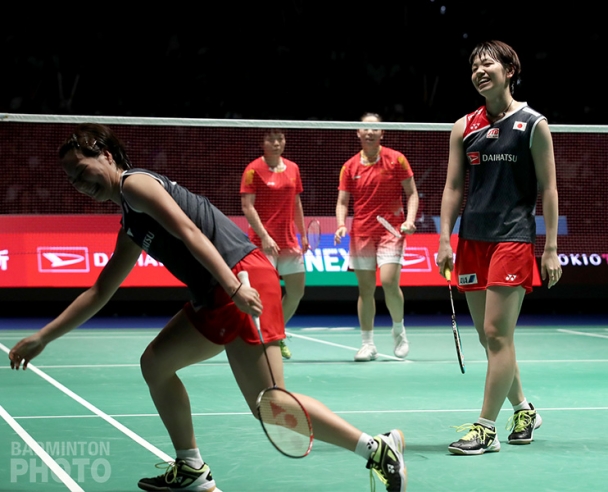
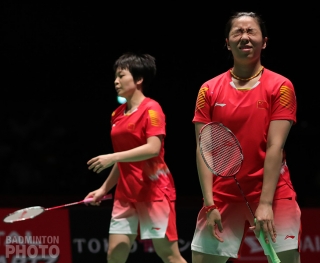
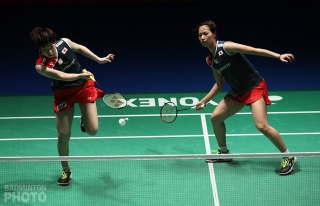
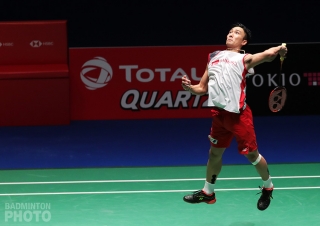
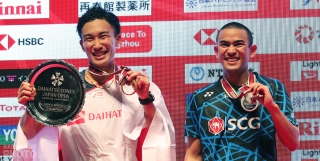
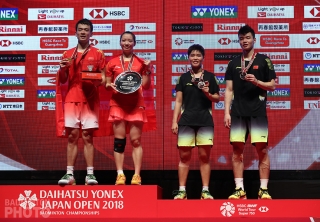
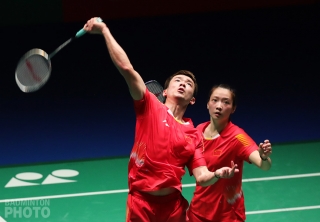
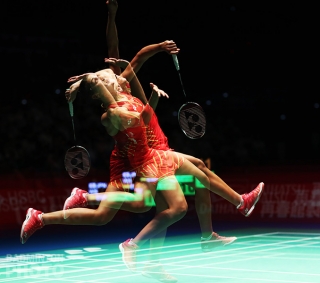
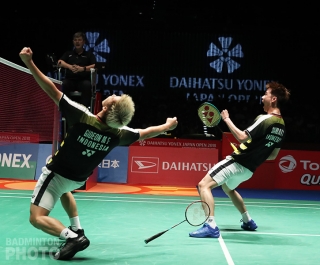
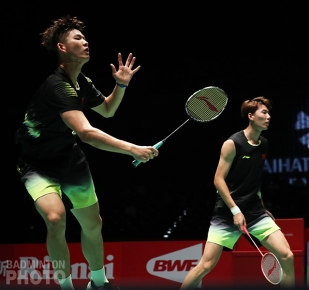
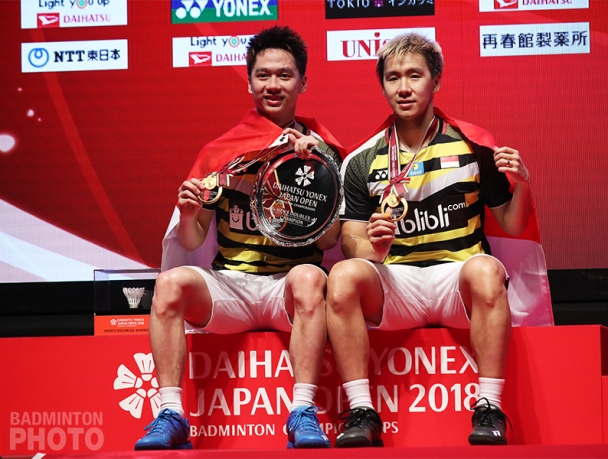

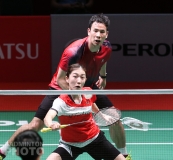
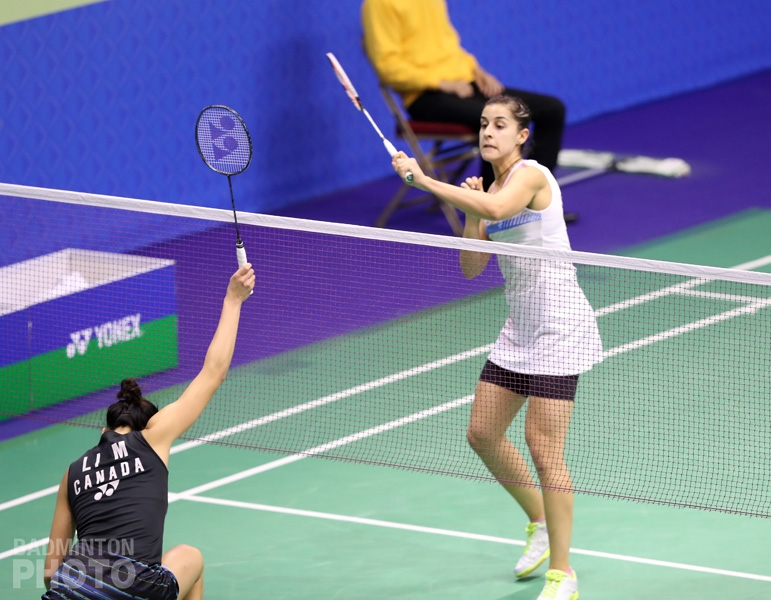
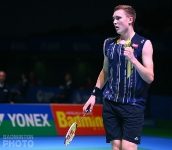
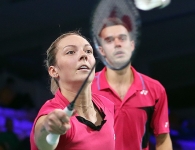
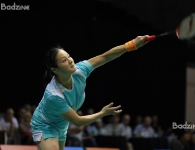
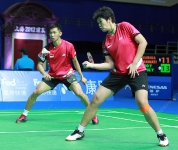
Leave a Reply